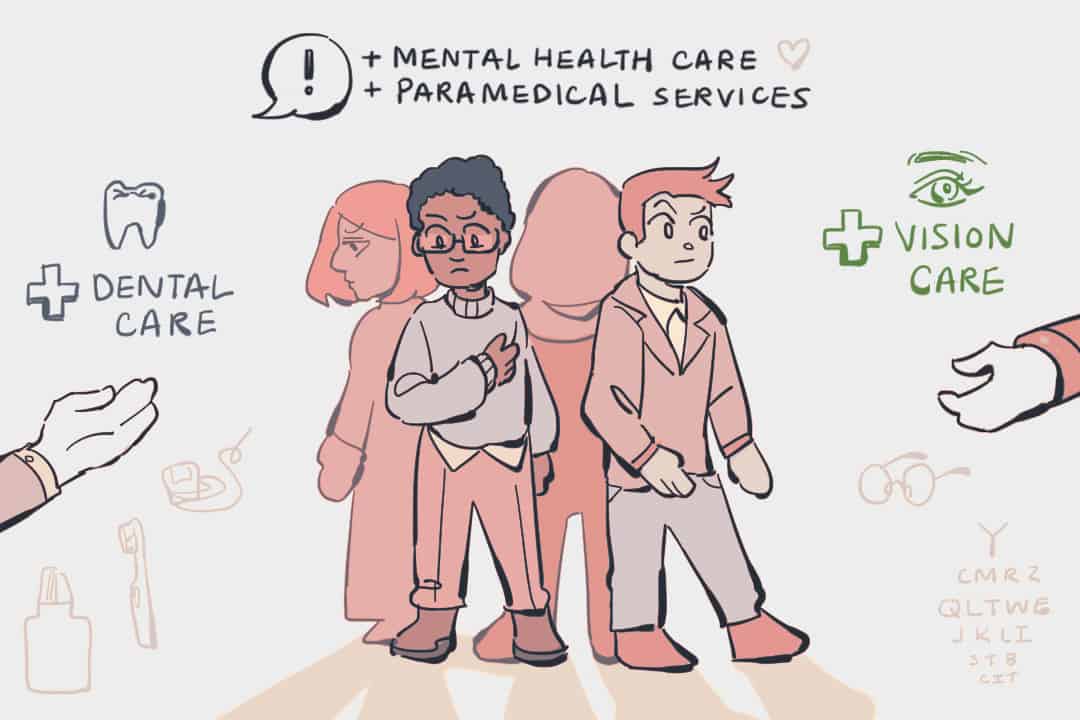As of November 1, members of the University of Toronto Faculty Association (UTFA), both active and retired, will see significant improvement in benefits concerning mental health, vision care, dental care, and paramedical services. These improvements come as a result of an agreement finalized on September 29 between the UTFA Negotiating Team for Salary, Benefits, Pensions, and Workload and the university administration. These benefits are for the third year of an ongoing deal between U of T and the UTFA.
Coverage increase
The coverage for mental health will increase to $7,000 from the original coverage of $5,000, which UTFA members have had for the last two years. Vision care benefits will increase from $700 to $725 per 24 months. Paramedical benefits — which include chiropractor, massage therapist, and occupational therapist services — will see a 200 per cent increase to $5,000. Lastly, under the Dependent Scholarship Program, dependents of UTFA members will be awarded scholarships worth 65 per cent of their academic fees, instead of the original 50 per cent.
U of T’s response
According to a U of T spokesperson, the agreement reached with the UTFA will address some of the outstanding salary, benefits, and workload issues from July 1, 2022 to June 30, 2023, which will be decided by Arbitrator Eli Gedalof in line with the dispute resolution process.
According to the UTFA, some of the outstanding issues include “reining in” excessive teaching workloads, creating a clear and reasonable distribution of workload and assignments, and establishing a minimum level of teaching assistant support.
The spokesperson continued that there has been work done to mutually resolve issues between the administration and the UTFA, with the Arbitrator already having issued an interim award for a one per cent salary increase effective July 1, 2022. The spokesperson explained that this agreement aligns with Bill 124 — an Act passed by the Ford government in 2019, which limited increases in total compensation, including benefit enhancements, to one per cent per year.
During the negotiation process, the UTFA also made efforts to secure fair and equitable workloads for faculty and librarians, as well as ensure timely payment of annual merit-based awards.
Negotiations and Bill 124
Vice-President Salary, Benefits, Pensions, and Workload Jun Nogami wrote to The Varsity, “UTFA members’ health benefits were insufficient to meet their needs in several key areas.” Referring to the need for better mental health benefits, he wrote, “faculty and librarians have been experiencing higher levels of stress, anxiety, depression, and other heightened mental health concerns over the past several years.”
Nogami added that Bill 124 limits across-the-board salary increases to one per cent a year, and the UTFA must bargain under these conditions.
Doug Ford and his government introduced and passed Bill 124, the Protecting a Sustainable Public Sector for Future Generations Act, in 2019. Under the bill, salaries for public sector employees can increase at most one per cent for every year within a three-year period after a collective agreement expires. This limitation has negatively impacted nurses and other health-care professionals as well as public-sector workers, including teachers.
Nogami wrote, “This made it even more important to make as many gains as possible… to offset the fact that salaries would rise much slower than inflation.”
Nogami noted that the UTFA was successful in resisting the administration’s attempts to deny benefit improvements for retired members of the association.
Currently, the UTFA remains in arbitration for several unsettled issues, primarily about excessive workload for both faculty and librarians. Nogami explained that student enrolment has significantly increased over the past few years, accompanied by growing class sizes, but the hiring of faculty members and librarians “has not kept pace.” He further said, “UTFA members are overworked which means that the student experience has suffered.”
According to Nogami, the negotiation process with the university administration was “long and drawn out and lasted for more than two years to reach a three-year deal.” This situation, he added, stemmed from a bargaining framework that “favours the administration.”
When a disagreement occurs between the UTFA and the university, Nogami explained, the UTFA is not guaranteed access to a “neutral dispute resolution process,” which presents a barrier in reaching a fair and timely solution. Nogami described the process as “unsustainable” and incapable of serving UTFA members well.
Nogami highlighted two principles that the administration implements in their bargaining process. He wrote that first, “they want to maintain the status quo in terms of the power that they have in determining virtually all terms and conditions of employment.” Second, he adds that “everything comes down to the money.” Nogami explained that each year, the university runs a budgetary surplus, yet the UTFA finds that the revenue is not allocated towards improvements in the student experience or working conditions for members of the association.
Ultimately, the UTFA came to the conclusion that, as an association, it must expand the scope of items to negotiate over and eliminate long and expensive delays in both bargaining and dispute resolution processes. They also hope to protect the terms and conditions of UTFA member employment between future agreements.
Editor’s note (November 16): In a previous version of this article, a UTFA statement about outstanding issues between the administration and the UTFA that included “reigning in” teaching workloads was misattributed to university administration. In addition, the previous version wrote that Bill 124 limited salary increases. In fact, Bill 124 limits increases in total compensation.


